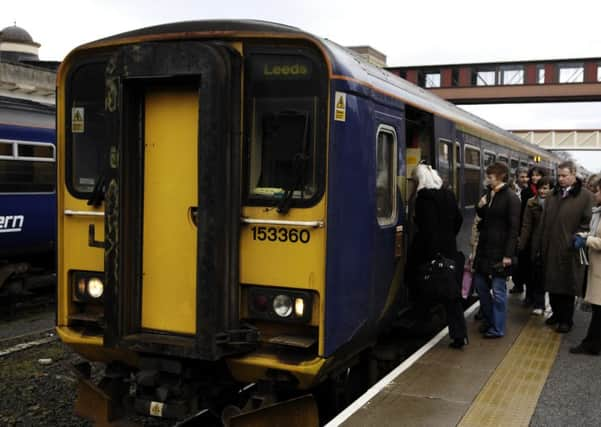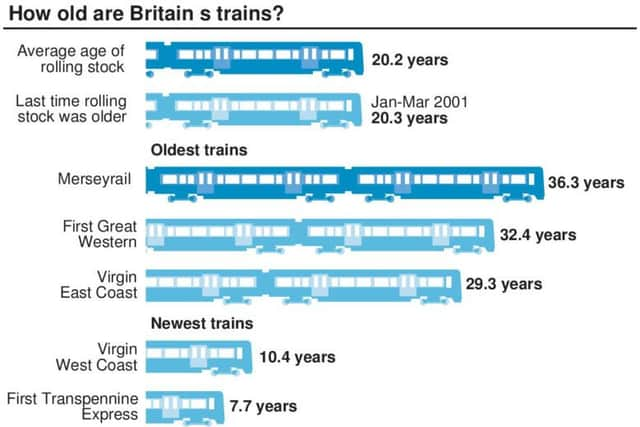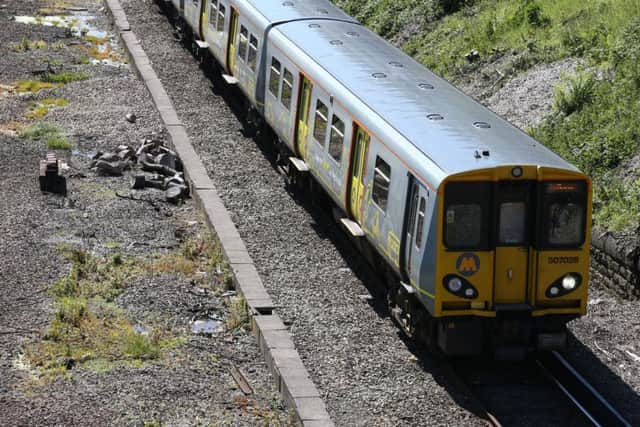North’s ageing trains are a ‘laughing stock’


The average age of trains across the country is 20.2 years, but it is much higher in the north, with two of Yorkshire’s biggest operators, Virgin Rail East Coast and Northern Rail, averaging 29.3 and 26.3 years respectively, according to the Office of Rail and Road (ORR).
Advertisement
Hide AdAdvertisement
Hide AdEd Cox, director at think-tank IPPR North, said: “Some of the North’s outdated train rolling stock could be considered more of a laughing stock, with carriages and overcrowding not fit for purpose for a burgeoning northern economy.


“Decades of chronic underinvestment in the North’s transport infrastructure has held back the region, with commuters and business frustrated by the poor service on offer.”
The Rail Delivery Group (RDG), which represents train operators and Network Rail, said thousands of new carriages will be introduced in the next few years.
But Coun Keith Wakefield, chair of West Yorkshire Combined Authority’s transport committee, said passengers needed assurances now that there would be significant improvements over the next few years in order to create a transport network that underpins economic growth.
Advertisement
Hide AdAdvertisement
Hide AdHe added: “Local passengers already know and have been telling us that despite paying more for their travel every year there aren’t enough trains to meet demand, and that a significant number of those that are available are long past their sell-by date.”


Passenger groups and rail unions have called for a new strategy to improve trains across the country.
Martin Abrams of the Campaign for Better Transport said thousands of passengers are travelling on trains “simply not fit for purpose”, and urged the Government to come up with a plan to replace outdated rolling stock.
“In the North of England passengers are still having to endure the decrepit old Pacer trains,” he said. “The problem is there’s no national rolling stock strategy from the Government and that’s what needs to change.”
Advertisement
Hide AdAdvertisement
Hide AdThe Department for Transport (DfT) has said all pacer trains must be replaced by the end of 2019, but for some, that does not come soon enough nor fix problems of the past that have seen the north suffer.
Mick Whelan, general secretary of Aslef, the train drivers’ union, claimed “the failure to introduce enough modern trains that treat the travelling public better than cattle” was one of the major failings of privatisation of the network.
He added: “Those passengers in the regions will always be disadvantaged by the cascading system of newer trains for the South East and intercity services, and hand-me-downs for everyone else.”
Mick Cash, general secretary of the Rail, Maritime and Transport union, said: “The lack of planning on Britain’s fragmented and privatised railways has left growing numbers of passengers travelling in clapped-out, overcrowded trains while the rip-off rail companies are laughing all the way to the bank.”
Advertisement
Hide AdAdvertisement
Hide AdTransport Salaried Staffs Association leader Manuel Cortes said the Government should “get a grip” and start investing in a railway and rolling stock “fit for this century, not the last one”.
The RDG insisted the private sector has invested billions of pounds in new trains over the past 20 years.
The organisation added that trains which have already been ordered will reduce the average age of the national fleet.
The DfT claimed it was committed to introducing modern trains and called on the rail industry to “come up with further innovative proposals” to improve rolling stock.
Advertisement
Hide AdAdvertisement
Hide AdA spokesman said: “We’re already making massive improvements through franchising - such as removing Pacer trains from the North of England and introducing new state-of-the-art trains on the East Coast, Great Western and Thameslink lines.
“By the end of 2019 there will be more than 3,700 extra carriages on the network compared to 2010.”
Virgin Trains, which took over the East Coast franchise in March, said it is investing £140m in improvements. Yesterday it announced a £16m contract to fit 35 newly refurbished diesel engines on its oldest fleet.
Northern Rail said by the end of the year it will have introduced 20 additional electric trains to its network, and that the next franchise owner, starting in April 2016, will introduce 120 new carriages, with every train “new or as new” by the end of the decade.
Advertisement
Hide AdAdvertisement
Hide AdMeanwhile, business leaders have called for urgent action to tackle the UK’s “creaking” railways, “clogged” roads and “crowded” airport runways, after a study by the CBI showed that most firms are worried about how quickly infrastructure projects are being delivered.
Director-general John Cridland said the arteries of modern Britain were “working overtime” and that better planning was needed to ensure businesses could grow.
Richard Robinson, chief executive of technical services firm AECOM - which helped with the research, said that “political procrastination” over infrastructure “threatens economic growth and jeopardises investment”.
He added: “When infrastructure decisions are deferred, business takes the hit.”
The CBI said business has been encouraged by government moves such as the creation of the National Infrastructure Commission, but there was a pressing need for “thorny issues” to be tackled.